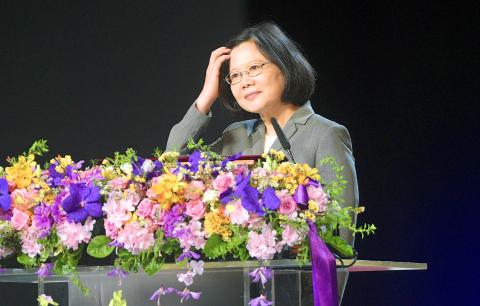President Tsai Ing-wen (蔡英文) yesterday reiterated her pledges to maintain cross-strait peace and Taiwan’s democratic system as she prepared to deliver her first Double Ten National Day speech today that is expected to be closely watched by China.
Tsai made the remarks in a speech at an event organized by the Overseas Compatriots Affairs Commission at the Taipei Arena yesterday afternoon. The event was attended by Taiwanese expats, as well as Presidential Office Secretary-General Lin Bih-jaw (林碧炤) and Legislative Speaker Su Jia-chyuan (蘇嘉全).
“More than four months have passed since we last met on the day of my inauguration in May. During this period, not one day has gone by that I have not remembered my promises to you, which are to take care of Taiwan and make it better,” Tsai said.

Photo: CNA
Tsai said that since taking office, her administration has encountered numerous challenges, some of which were unexpected, while others are structural problems that have accumulated over time.
Saying that achieving regional peace requires a concerted effort among all concerned parties, Tsai said she is aware of the significant public attention paid to cross-strait development and that her government would keep its promises.
“We are determined to create a consistent, sustainable and predictable cross-strait relationship, as well as to maintain peace across the Taiwan Strait and Taiwan’s democratic ‘status quo,’” Tsai said.

Photo: CNA
She said her principles in dealing with cross-strait ties include maintaining her promises and goodwill, never succumbing to pressure and refusing to revert to the old path of confrontation.
Both sides of the Taiwan Strait should sit down and seek to solve problems through dialogue as soon as possible, Tsai said.
Tsai’s remarks came amid speculation by political analysts that cross-strait relations could further deteriorate should the president’s Double Ten National Speech fail to satisfy Beijing.
China has imposed a series of punitive measures against the Tsai administration due to its refusal to acknowledge the so-called “1992 consensus,” including suspending official cross-strait communication mechanisms, further squeezing Taiwan’s international space and reducing the number of Chinese tourists to Taiwan.
The “1992 consensus” refers to a tacit understanding between the Chinese Nationalist Party (KMT) and Beijing that both sides of the Taiwan Strait acknowledge there is “one China,” with each side having its own interpretation of what “China” means. Former Mainland Affairs Council chairman Su Chi (蘇起) said in 2006 that he had made up the term in 2000.
A source familiar with Tsai’s Double Ten National Day speech, who spoke on condition of anonymity, said her address would not focus too much on cross-strait issues, but rather on the president’s domestic policies, such as promoting reforms in the pension, social housing and long-term care systems, as well as transitional justice.
The source said Tsai would pledge to continue her government’s efforts to expand Taiwan’s participation in international organizations and redefine Taiwan’s role in the Asia-Pacific region.
In relation to cross-strait issues, Tsai would maintain the stance she set in her inauguration speech and table a “new four noes” principle, the source said.
Presidential Office spokesman Alex Huang (黃重諺) said the theme of Tsai’s Double Ten National Day speech is “striding forward with a firm step and building a greater nation through reforms.”
Huang said the speech consists of three aspects: the government’s policy direction and blueprint for the nation, achievements in the government’s efforts to improve Taiwan’s international participation and reiteration of the government’s stance on cross-strait ties.
Additional reporting by Chun Li-hua

The CIA has a message for Chinese government officials worried about their place in Chinese President Xi Jinping’s (習近平) government: Come work with us. The agency released two Mandarin-language videos on social media on Thursday inviting disgruntled officials to contact the CIA. The recruitment videos posted on YouTube and X racked up more than 5 million views combined in their first day. The outreach comes as CIA Director John Ratcliffe has vowed to boost the agency’s use of intelligence from human sources and its focus on China, which has recently targeted US officials with its own espionage operations. The videos are “aimed at

STEADFAST FRIEND: The bills encourage increased Taiwan-US engagement and address China’s distortion of UN Resolution 2758 to isolate Taiwan internationally The Presidential Office yesterday thanked the US House of Representatives for unanimously passing two Taiwan-related bills highlighting its solid support for Taiwan’s democracy and global participation, and for deepening bilateral relations. One of the bills, the Taiwan Assurance Implementation Act, requires the US Department of State to periodically review its guidelines for engagement with Taiwan, and report to the US Congress on the guidelines and plans to lift self-imposed limitations on US-Taiwan engagement. The other bill is the Taiwan International Solidarity Act, which clarifies that UN Resolution 2758 does not address the issue of the representation of Taiwan or its people in

US Indo-Pacific Commander Admiral Samuel Paparo on Friday expressed concern over the rate at which China is diversifying its military exercises, the Financial Times (FT) reported on Saturday. “The rates of change on the depth and breadth of their exercises is the one non-linear effect that I’ve seen in the last year that wakes me up at night or keeps me up at night,” Paparo was quoted by FT as saying while attending the annual Sedona Forum at the McCain Institute in Arizona. Paparo also expressed concern over the speed with which China was expanding its military. While the US

SHIFT: Taiwan’s better-than-expected first-quarter GDP and signs of weakness in the US have driven global capital back to emerging markets, the central bank head said The central bank yesterday blamed market speculation for the steep rise in the local currency, and urged exporters and financial institutions to stay calm and stop panic sell-offs to avoid hurting their own profitability. The nation’s top monetary policymaker said that it would step in, if necessary, to maintain order and stability in the foreign exchange market. The remarks came as the NT dollar yesterday closed up NT$0.919 to NT$30.145 against the US dollar in Taipei trading, after rising as high as NT$29.59 in intraday trading. The local currency has surged 5.85 percent against the greenback over the past two sessions, central